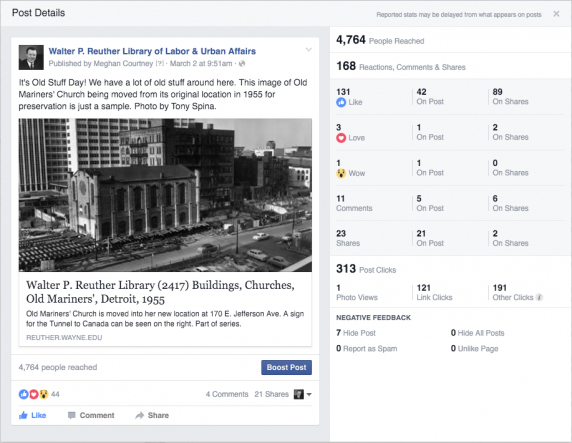Tech Talk -- Social Media Outreach
The Reuther Library’s Facebook presence has been alive and well since our first posts were submitted back in 2009. Over the course of our nearly seven years of use, Facebook has steadily risen to the top of the Internet by adding people from all over the world. In fact, many sources indicate that Facebook’s popularity has propelled it to the second most trafficked site on the Internet. Its popularity has benefitted the Reuther Library through what is known as referrals. We know from monitoring both insights and web analytics that there is a direct correlation between our Facebook efforts and increases to those who access our web site. Our content is used throughout the world and social media has helped boost our overall visibility, at least by a little. This increased visibility has led many users that had little to no knowledge of our library to seek us out and connect.  But Facebook is not, nor has it ever been, an official library service platform. Its overall success is a bit of a double-edged sword. On the one hand, we want to use it to engage our users and hopefully get the opportunity to direct them towards our official communication streams like email and reference services, and on the other, we don't want to create the impression that Facebook is the best and final place to learn about us and the finer points of our holdings.
But Facebook is not, nor has it ever been, an official library service platform. Its overall success is a bit of a double-edged sword. On the one hand, we want to use it to engage our users and hopefully get the opportunity to direct them towards our official communication streams like email and reference services, and on the other, we don't want to create the impression that Facebook is the best and final place to learn about us and the finer points of our holdings.
While Facebook and our other social media accounts like Twitter were never intended to supplant or supersede our formal lines of communication with our users, we must be aware of the possibility that some may be reluctant to go beyond the realm of social media when conducting their online research. It is important to get our message across using social media while maintaining that it is little more than an outreach tool. We can demonstrate that we are able and willing to meet our user-base on social media sites, while also making it apparent that there is an additional “next step” in terms of the service we provide. We want those people using Facebook and other social media sites to make the small leap from these semi-professional connections, to engaging us on our more robust and academically sound platforms. Efforts are made to keep the lines from blurring across platforms. For instance, content pulled from our collections is never posted directly to social media. Instead we link to the actual online content where it lives on our various servers. In this way we guarantee the content’s integrity while maintaining the context that it falls within. Because we have a deep interest in maintaining the links between content and context, we try very hard to reduce any form of user confusion that may arise due to disparate platforms. It is as much a matter of policy as it is common sense that we seek proper attribution when referencing Reuther Library material. Pro tip: If you’re citing content found within a Facebook post, you are not citing it correctly. Instead follow that link and cite its actual location. We explicitly try to avoid confusing our users and this is but one example of how we’re trying to accomplish it. Your help is most appreciated.
Our social media outreach has perhaps shifted the perception away from the Reuther Library as little more than a physical building with a bunch of old stuff. We hope our users understand that we are an international contributor to a growing body of digital scholarly information that is available to anyone, anywhere, at any time. This is a good thing. As we try to align practices more with our growing populations of technologically advanced users who have grown to expect online content, our social media efforts provide just one example of this endeavor. So while we continue to engage our users within the multitude of places conceivable within the online environment, our mission remains to educate and connect them with materials that they seek without causing any unnecessary confusion or delays. Like and share our posts, but if you really want to engage “Ask an archivist” about using collection materials for your own purposes.
Paul Neirink is the Digital Resources Specialist for the Walter P. Reuther Library

 Reddit
Reddit Facebook
Facebook LinkedIn
LinkedIn